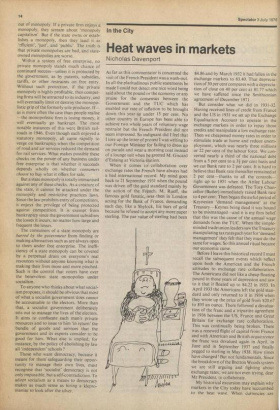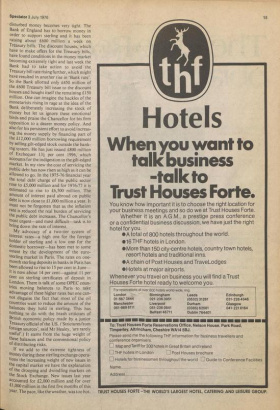In the City
Heat waves in markets
Nicholas Davenport
As far as this commentator is concerned the visit of the French President was a wash-out. In all the platitudinous public statements he made I could not detect one nice word being said about the pound or the economy or any praise for the consensus between the Government and the TUC which has enabled our rate of inflation to be brought down this year to under 15 per cent. No other country in Europe has been able to achieve two whole years of voluntary wage restraint but the French President did not seem impressed. So indignant did I feel that [tore up the letter of protest was writing to our Foreign Minister for failing to dress up on parade and wear a morning coat instead of a lounge suit when he greeted M. Giscard d'Estaing at Victoria station.
When it comes to collaboration over exchange rates the French have always had a bad international record. My mind goes back to 21 September 1931 when the pound was driven off the gold standard mainly by the action of the French. M. Rueff, the famous gold fanatic, was then in London acting for the Bank of France, demanding each day, like a Shylock, his bars of gold because he refused to accept any more paper sterling. The par value of sterling had been $4.86 and by March 1932 it had fallen in the exchange markets to $3.40. That depreciation of 30 per cent compares with a depreciation of close on 40 per cent at $1.77 which we have suffered since the Smithsonian agreement of-December 1971.
But consider what we did in 1931-32. Having received lines of credit from France and the US in 1931 we set up the Exchange Equalisation Account to operate in the exchange markets in order to repay those credits and manipulate a low exchange rate. Then we cheapened money rates in order to stimulate trade at home and reduce unemployment, which was nearly three millions or 22 per cent of the labour force. We converted nearly a third of the national debt from a 5 per cent to a 3. per cent basis and we cut Bank rate to 2 per cent. It is hard to believe that Bank rate thereafter remained at 2 per cent—thanks to all the controls— right up to 1951 when the Attlee Labour Government was defeated. The Tory Chancellor (Butler) immediately raised Bank rate to 4 per cent. Then began the awful period of Keynesian 'demand management' at the Treasury—Keynes being dead it was bound to be mismanaged—and it is my firm belief that this was the cause of the annual wage demands from the TUC. When the simpleminded trade union leaders saw the Treasury Manipulating tax rates 9ach year for 'demand management' they felt that they must do the same for wages. So this annual ritual became our economic curse.
Before I leave this historical record I must recall the subsequent events which reflect upon both the American and the French attitudes to exchange rate collaboration. The Americans did not like a cheap floating pound in those years of depression and saw to it that it floated up to $4.22 in 1933. In April 1933 the Americans left the gold standard and only returned to it in 1934 when they wrote up the price of gold from $20.67 to $35 an ounce. There followed a devaluation of the franc and a tripartite agreed-lent in 1936 between the US, France and Great Britain for exchange rate collaboration. This was continually being broken. There was a renewed flight of capital from France and with American and British acquiescence the franc was devalued again in April, in June and in September 1937 and finally pegged to sterling in May 1938. How times have changed! But not fundamentals. Since the breakdown of the Bretton Woods system we are still arguing and fighting about exchange rates; we are not even trying, dear Mr President, to collaborate.
My historical excursion may explain why markets in the City today have succumbed to the heat wave. When currencies are
disturbed money becomes very tight. The Bank of England has to borrow money in order to support sterling and it has been raising about £600 million a week on Treasury bills. The discount houses, which have to make offers for the Treasury bills, have found conditions in the money market becoming extremely tight and last week the Bank had to take action to avoid the Treasury bill rate rising further, which might have resulted in another rise in 'Bank rate'. So the Bank allotted only £450 million of the £600 Treasury bill issue to the discount houses and bought itself the remaining £150 million. One can imagine the hackles of the monetarists rising in rage at the idea of the Bank deliberately increasing the stock of money but let us ignore these emotional birds and praise the Chancellor for his firm Opposition to a dearer money policy. And also for his persistent effort to avoid increasing the money supply by financing part of the £12,000 million borrowing requirement by selling gilt-edged stock outside the banking system. He has just issued £800 million of Exchequer 13i per cent 1996, which accounts for the indigestion in the gilt-edged market. In my view the cost of servicing the Public debt has now risen as high as it can be allowed to go. In the 1975-76 financial year the total debt charge of the public sector rose to £5,000 million and for 1976-77 it is estimated to rise to £6,500 million. The amount of interest paid abroad on public debt is now close to £1,000 million a year. It must not be forgotten that as the inflation rate is reduced the real burden of servicing the public debt increases. The Chancellor's most urgent—and most difficult—task is to bring down the rate of interest.
My advocacy of a two-tier system of interest rates—a high one for the foreign holder of sterling and a low one for the domestic borrower—has been met to some extent by the development of the eurosterling market in Paris. The rates on onemonth sterling deposits in banks in Paris has been allowed to rise to 15 per cent in June— it is now about 14 per cent—against 11 per cent on sterling certificates of deposit in London. There is talk of some OPEC countries moving balances to Paris to take advantage of these higher rates but one cannot disguise the fact that most of the oil
countries want to reduce the amount of the balances they hold in sterling. This has nothing to do with the brash criticism of British economic policy made by a junior Treasury official of the US. ('Strictures from
foreign sources', said Mr Healey, are rarely useful'.) It stems from the huge weight of these balances and the conventional policy of distributing risks.
If we add to the extreme tightness of money during these sterling exchange operations the increasing weight of new issues in the capital market we have the explanation of the drooping and dwindling markets on the Stock Exchange. New issues last year accounted for £2,000 million and for over
£1,000 million in the first five months of this Year. The pace, like the weather, was too hot.



































 Previous page
Previous page